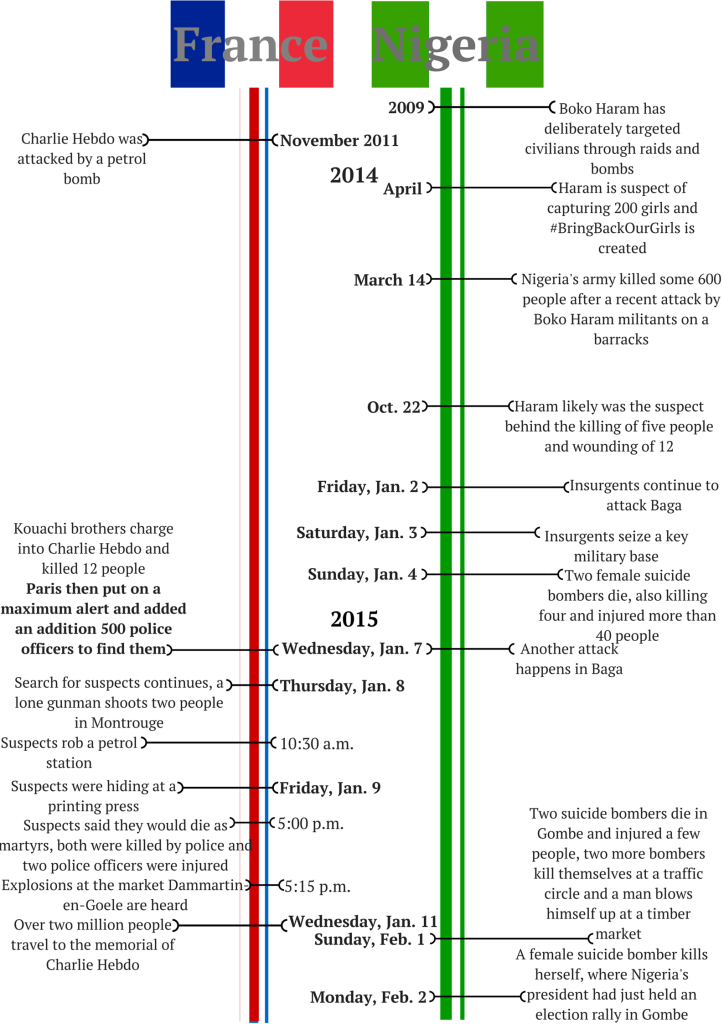
On Jan. 7, social media and news outlets covered storming of the Kouachi brothers, in the French satirical magazine, Charlie Hebdo, but on that very same day Nigeria battled a conflict that has been going on for the past five years.
Over two million people traveled to France, to stand in solidarity with those who were killed because of their recent satirical publication of the Prophet Muhammad on the cover of Charlie Hebdo. 85 hours south and 6,017 kilometers or 3,739 miles away from France, in Nigeria, mass murder, torture, exploitation and large amount of displaced people fear for their lives every single day.
What happened in France is absolutely terrible. The lives of innocent people were taken at the hands of terrorists. However, what if your own government took the lives of innocent people?
While the Kouachi brothers killed 17 people, Boko Haram has been the cause of many war crimes and murders in Nigeria. While Paris was adding an additional 500 police officers to help find the terrorists, another insurgency was happening in Baga.
“Boko Haram has terrorized northern Nigeria regularly since 2009, attacking police, schools, churches and civilians, and bombing government buildings,” CNN said. “[Haram] has also kidnapped students, including more than 200 schoolgirls who were abducted in April and remain missing.”
Some news outlets picked up on the attacks in Nigeria and have been following them, but Charlie Hebdo seemed somewhat more important, especially to Americans. Just because something is happening far away, does it still mean we should not care? Absolutely not.
Jeffrey D. Sachs, professor at Columbia University believes, “It’s up to us. We can choose to shift the responsibility… or we can choose to shift the paradigm.”
According to the Famine Early Warning, Nigeria is in a crisis of acute food insecurity because of the continuous conflict of created by Boko Haram.
“‘More than 2,000 people were killed in attacks on 16 villages,’ Bukar said. ‘He could not explain how he arrived at that toll,’” according CNN. “‘At least 30,000 people were displaced,’ authorities said. ‘About 20,000 of the displaced camped in Maiduguri city, the capital of Borno state.’”
So why don’t the media talk about Nigeria more? Why did so many people connect and relate to the people of Charlie Hebdo? Was it the demographics? Was it that Americans relate more to France? Maybe. But as consumers, producers, people in society, we should be standing in solidarity with all of our brothers and sisters no matter where they are, what they look like or what economic class they fall in.
To create this timeline, these were the websites researched:
Islamic extremist attack in Nigeria named the ‘deadliest massacre’ in history , Boko Haram’s ‘deadliest massacre’ reportedly kills 2,000 in Nigeria, 2,000 dead: Massacre deadliest in Nigerian history, Charlie Hebdo attack: Three days of terror, ‘We are here to support freedom. We will not be beaten’, Boko Haram Giwa barracks attack: Nigerian army ‘killed hundreds’
Correction: The print edition of Loquitur conflates the actions of Boko Haram and charges against the president of Nigeria. The online edition corrects the error.


